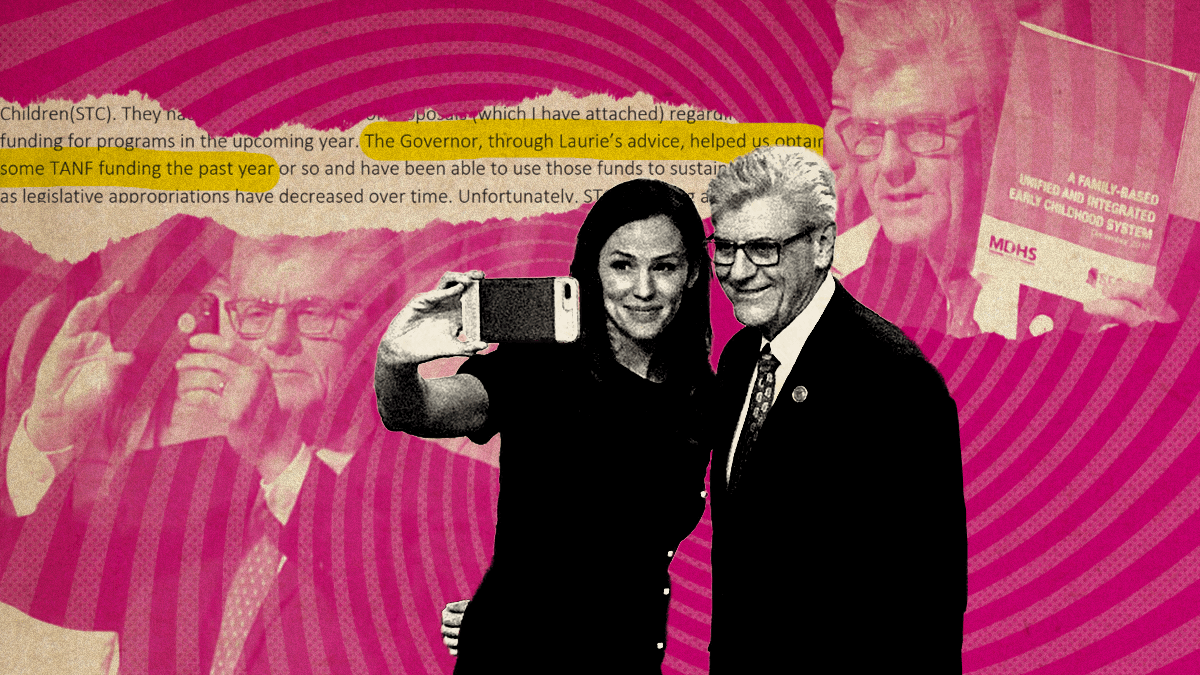Mississippi News
Phil Bryant’s star-powered selfies didn’t Save the Children

Phil Bryant’s star-powered selfies and slick brochures didn’t Save the Children
As Jennifer Garner spoke about growing up and her family’s narrow escape from poverty in West Virginia, a C-SPAN camera panned over to then-Mississippi Gov. Phil Bryant.
From across the room, Bryant held up his cellphone with both arms, capturing video of the “13 Going on 30” actress on his device.
Garner and Bryant were together at a panel on early childhood education at the 2017 National Governors Association meeting in Washington.
As many politicians do, Bryant liked to leverage his proximity to celebrities like country music singers, star athletes and even a reality TV personality to advance his agenda.
When it was his turn to speak, Bryant began by name-checking a low-income grandmother Garner had recently met in the Mississippi Delta town of Mound Bayou. Tracy Price’s grandchildren attended the nearby elementary school where Garner read to students during her visit.
“I hope Tracy Price is doing good,” Bryant said. “We sent Tracy a selfie yesterday so Jennifer could tell them she’s gone to the top of the government in Mississippi to make sure Tracy gets help.”
Garner beamed, nodding her head. Bryant’s comment suggested that Garner – the kind of “elite Hollywood liberal” that conservatives often mock – had some pull with the governor, that someone with her stardom wielded influence in the Magnolia State.
But like many low-income parents who were systematically denied government benefits during Bryant’s administration, Price did not, in fact, “get help.”
“Jennifer came to my house,” Price, 62, told Mississippi Today when the publication found her in January. “But I have gotten nothing from anybody since then. I have not received a thing. … Nothing. I had my grandkids here and I was losing my house and everything. They never reached out to me.”
When Garner arrived at her home, Price added, “I had no idea who she was.”
Then-Gov. Phil Bryant said Garner “went to the top of the government in Mississippi to make sure” the grandmother received help, but none ever came.
A few months after Bryant and Garner’s exchange in Washington, Bryant’s office arranged for the Mississippi Department of Human Services to start awarding welfare money to the international nonprofit that Garner represented in the meeting. The organization would later give Bryant a shiny award.
Save the Children, a century-old and well-regarded humanitarian organization, has received about $2 million in funding from Mississippi’s Temporary Assistance for Needy Families grant since then.
TANF, the subject of a sprawling fraud investigation in Mississippi, is an anti-poverty program best known for providing direct cash assistance to poor families.
When Save the Children came on the welfare scene, the state was denying more than 98% of poor families applying for the cash benefit while investigators say officials were misspending and embezzling millions from the program. On Bryant’s watch, more than $70 million that the welfare agency passed through two private nonprofits was misspent, according to independent auditors.
Unlike the more conspicuous welfare contractors, Save the Children received its welfare funding directly from the welfare agency for legitimate literacy, after-school and summer programs. Auditors did not find any of its funding was improper.
But a deeper look at Save the Children’s connection to the welfare program reveals how Bryant used the group to project an image that his administration was implementing innovative approaches to battling chronic poverty and nationally recognized early childhood development, even though the plan never got off the ground. Mississippi remains near the bottom of most national rankings dealing with early childhood development and well-being.
Price said she was initially turned off by Save the Children’s involvement in Mississippi, since the international group is best known for using private donations to aid and educate children in war-torn countries and after natural disasters.
“My whole thing was I kept asking, ‘Why do we have to save the world?’” Price told Mississippi Today. “We can start saving stuff right here. We’ve got a need here. … Charity starts at home.”
But less prominently, Save the Children also operates as a government contractor across the United States.
Save the Children says it has served people in Mississippi for more than 80 years, and former officials and advocates told Mississippi Today the organization really elevated its state presence in 2005 during the aftermath of Hurricane Katrina. It most notably raised private money to build a new child care center on the Coast. The group also took over the federally funded Head Start Center in Sunflower in 2014 after it won the federal grant over the local organization that ran it before.
Ever since, Save the Children has received funding from the Mississippi Department of Education to provide literacy, nutrition and fitness programming in Mississippi’s notoriously underfunded public school system. Reports show it also runs a home-visiting program to coach parents on the best early childhood practices. Save the Children says it matches the public funding it gets with private dollars, almost 2-to-1 in Mississippi, to boost its state programs.
In 2020, Save the Children reported that 91% of 3-year-olds who spent at least one year in its “Early Steps” program had an average or above average vocabulary.
“I have never met a parent that didn’t want to give their child the best possible start in life, but many that just don’t know how. So that’s why these programs are so important,” said Yolanda Minor, Save the Children’s Mississippi State Director. “… We go in and assess the parent, build their self-confidence, provide those age-appropriate activities.”
Current Gov. Tate Reeves awarded the charity more than $460,000 from the Governor’s Emergency Education Response (GEER) pandemic relief funds in 2021. Since current MDHS director Bob Anderson took over and promised to clean up the agency, Save the Children is one of the few welfare grantees introduced during the scandal who is still receiving TANF grants through a newly implemented competitive bid process. In its 2020 application for TANF funding, Save the Children said it employs 160 people in Mississippi and serves 7,529 children and parents.
Save the Children fits as a TANF recipient because in addition to the “welfare check,” states may use the federal dollars for a variety of services including child care, workforce training, transportation, parenting classes and aid to children at risk of abuse and neglect.
Mississippi Today examined Save the Children’s introduction into the welfare landscape, and like all subgrantees at the time, the charity did not have to win a competitive bid to receive funding. They just had to have the governor’s ear.
Emails show Bryant and his education policy adviser Laurie Smith had a hand in channeling welfare funds to Save the Children for the first time in 2017.
Smith, originally from Arizona, was a public school teacher who eventually served as director of Mississippi Building Blocks, an early education and child care center training program launched in 2008 by former Netscape CEO and philanthropist Jim Barksdale’s reading institute.*
Gov. Bryant’s publicly stated policy preferences – “school choice” and resistance to fully-funding public schools – were opposite those Barksdale endorsed. Yet the governor eventually tapped Smith as his education policy adviser in 2012.
Smith, who led both the State Early Childhood Advisory Council and the State Workforce Investment Board for Bryant, had great control and decision-making power in her position in the governor’s cabinet.
They seemed to take a special interest in keeping tax dollars flowing to Save the Children.
“The Governor, through Laurie’s advice, helped us obtain some TANF funding the past year or so and have been able to use those funds to sustain programs as legislative appropriations have decreased over time,” a lobbyist for Save the Children wrote in an email to former MDHS director Davis in November of 2018.
Save the Children had been receiving a $150,000 direct allocation within the Legislature’s annual education appropriations bill, but in 2018, it was reduced to $50,000.
Trevor Moe, Save the Children’s Managing Director of Partnership Development, told Mississippi Today that it is not unusual for the organization to press leaders to find the funding so it can keep providing services to kids in need. While Save the Children does refer families to other resources, they keep a narrow focus on kids.
“Our approach to dealing with governors, elected officials, is … we’re very zealous about advocating for rural kids – unabashedly so,” he said.
Price said Save the Children selected her as a parent advocate in 2016 because of her involvement at one of the schools it served.
Years later, during a particularly difficult time in her life near the beginning of the COVID-19 pandemic, Price sent an email to the organization.
“I would love to do more but I am struggling to hold my life together,” Price wrote. “I have nobody to help me … Jen said that she would never forget me yet I knew that we would never meet again. Who helps us in our own country? … I am rich at heart but struggling to make ends meet. I have never reached out to anyone. Can your world wide organization help me?”
Price said she never received a response.
Garner has served as an ambassador for Save the Children for more than a decade, with a focus on early childhood development, an area of special concern in Mississippi. Science shows that the first five years of a child’s life is the most critical for brain development. Experts say that supporting development in a child’s earliest years, even before pre-K, is an effective way of interrupting generational poverty.
Today, more than one in four Mississippi children live in poverty, the highest rate in the nation. For Black children, the poverty rate is 43%.
There are several agencies that operate public programs for the youngest Mississippians: the health department has an early intervention program; Medicaid provides health insurance and case management; some public schools offer pre-K through what are called Early Learning Collaboratives; and local community organizations operate federally funded Head Start programs for low-income families.
But the state’s private child care industry, which does not receive a direct allocation in state or federal budgets, is an often overlooked avenue for helping the tens of thousands of babies and young kids it impacts on a daily basis.
The Mississippi Department of Human Services, which saw massive misspending and theft allegations during the Bryant administration, is in charge of the federal fund that props up these private child care centers in low-income areas.
The fund, the Child Care Development Fund, provides vouchers to working class parents so they can afford the child care that allows them to keep a job. The agency’s child care division also grants some of the money to centers that qualify so they can make improvements in accordance with a state plan and quality rating system the division develops.
During his administration, Bryant acknowledged the importance of early education and claimed Mississippi was making progress in that arena. He singled out Save the Children as a key player in making it happen.
At that 2017 governor’s meeting, he held up an orange and fuschia booklet with a wordy title in white letters across the front: “Family Based Unified and Integrated Early Childhood System.”
“The great thing about Save the Children is, we have a statewide plan,” he said, pamphlet in hand. “We worked three years on this, for early childhood learning in the state of Mississippi and this program fits exactly into this plan. It was almost as if, through fate, perhaps divine intervention, that Save the Children came to be a part of this.”
The plan included several components but the main objective was two-fold: To usher in a new child care quality rating system, replacing an old controversial policy, and to increase training opportunities in private child care centers so the employees can appropriately educate, not just supervise, the kids in their care. The less-than-novel concept mirrored the Building Blocks program Smith previously ran. They called this new training effort Early Childhood Academies, which purported to partner with Families First for Mississippi, the program that was misspending tens of millions of TANF funds.
“We’ve been creative in the funding,” Bryant said in the meeting. “We use TANF. Delta Regional Authority has been a part of this. Private funds. Wherever we can find funds, we go and do so.”
The previous quality rating system, which rated centers one through five stars and provided higher reimbursement rates to centers who scored higher, had proved unsuccessful. Fewer than half of centers participated, and advocates complained that the policy worsened racial inequity and offered few resources to actually help centers improve. A 2016 U.S. Commission on Civil Rights investigation into Mississippi’s child care voucher program found that “far too many eligible children are not serviced by the subsidy program, and that the money that should support this eligible population of children is redirected elsewhere.”
The new system was to rate centers either “standard” or “comprehensive.” Standard centers would meet minimum guidelines, plus additional training and professional development, while comprehensive centers would provide more staff coaching and conduct child assessments, among other requirements. Centers would have to rate as standard to participate in the voucher program while comprehensive centers would receive higher reimbursement rates.
Mississippi received a federal $10.6 million Preschool Development Grant at the end of 2018 to implement the plan.
But the idea, concocted by Laurie Smith and data scientist Mimmo Parisi of the governor-appointed State Early Childhood Advisory Council, barely materialized. The former council’s website, along with the reports and information it published at that time, was eventually wiped from the internet.
“Everybody interested in participating in the comprehensive plan was invited to a luncheon,” said Amy Berry, director of Little Saints Academy, which received $5,000 through the grant to buy a laminator among other equipment. “They served really nice food, gave us little plaques, gave us all kinds of little trinkets and stuff. They were just spending the money, in essence.”
State leadership placed the grant under the Mississippi Community College Board. The board then hired Austin Smith, the nephew of then-MDHS director John Davis, to serve as the program manager.
Austin Smith (no known relation to Laurie Smith) was also hired to develop a “coding academy” for Families First for Mississippi, the MDHS-funded program that perpetuated the welfare scandal. A forensic audit of the department showed that his employment history included restaurants, a canoe rental company and his father’s landscaping business and suggested he was not qualified to conduct this work. Austin Smith received an auditor’s office demand to repay the state almost $380,000.
His uncle, Davis, also a Bryant appointee, is currently awaiting trial in what officials have called the largest public embezzlement case in state history.
The FBI also investigated the board’s spending of the preschool grant in 2020, former Mississippi Community College Board Director Andrea Mayfield told Mississippi Today, but have not made any public allegations surrounding it.
Behind the scenes of the preschool grant, communication shows Laurie Smith was calling the shots with a particular interest in Save the Children. Mayfield, another Bryant appointee who chaired the governor’s workforce board that Laurie Smith directed, worked closely with Smith to carry out her vision.
“Hi- will you continue with save the children funding?” Laurie Smith texted Davis on June 21, 2019, just a few days before investigators would administer his first polygraph test and he would be forced out of office. “I’m going to have pdg (Preschool Development Grant) pay for some additional work.”

Mississippi Today requested all expenditure documents, invoices and receipts pertaining to the Preschool Development Grant funding. Save the Children does not appear as a direct subgrant recipient. The organization said it never received this funding.
Under the grant, the community colleges sent trainers out to participating child care centers to work with the staff and read to the children, but Berry said the training her center received was too sporadic and short lived to result in meaningful progress. Much of the money also went to private day care centers to buy equipment like printers and laptops or supplies like ink and markers.
About $190,000 went to Mississippi Community Education Center founded by Nancy New, a key figure in Mississippi’s unraveling welfare scandal. Records show the nonprofit used most of the money to purchase commodities and equipment for child care centers.
Overall, Mississippi spent only about 60% of the preschool funds it was awarded, the final expenditure report shows, leaving about $4.2 million unspent.
“There was nothing beyond giving child care centers furniture,” Deloris Suel, owner of Prep Company Tutorial School in Jackson, said of the grant. “That was the biggest part of it.”
Near the end of Bryant’s last term in October of 2019, then-President Donald Trump appointed Laurie Smith to lead the U.S. Department of Labor’s Women’s Bureau. Now, she’s a partner at Bryant’s lobbying company; her work with Building Blocks is absent from her staff profile on the firm’s website.
Laurie Smith declined to interview for this story, but she sent the following statement: “Although I wasn’t there at the time, once the decision to not move forward with the comprehensive model was made, returning federal taxpayer dollars seems like a responsible decision.”
By the end of the grant period in early 2020, the department had still failed to designate any centers as “comprehensive,” and the rating system was soon abandoned. The state was relying on an additional $10 million federal grant it applied for in late 2019 in hopes of keeping the plan intact. Save the Children representatives said they had discussed working under this grant with state leaders, and even assisted Mississippi with its application.
In a recent interview with Mississippi Today, Bryant said that the state secured $50 million for this early childhood program – which records show is not true. Laurie Smith also told Mississippi Today in 2019 that the state would be going after a $50 million grant, but it only applied for $10 million.
The government eventually rejected Mississippi’s application and the whole operation collapsed.
“It was a complete failure to launch,” said Debbie Ellis, owner of Greenwood child care center The Learning Tree and leader of a coalition of providers in the Mississippi Delta. “And it set us back years.”
Today, there is no child care quality rating system in Mississippi.
Yet, Bryant was still touting the defunct program as recently as December 2020.
“When I was governor, I helped create the Family Based Unified and Integrated Early Childhood System, which connects and integrates resources and services for both parents/caregivers and their children,” Bryant said well after the grant was over and the program ceased to function. “This system was expanded as Mississippi secured a $10.6 million federal Preschool Development Grant. This grant funding is helping to strengthen the state’s early childhood systems and improve access and quality for Mississippi families with children age five and under.”
Mississippi Today informed Bryant that no centers ever received the comprehensive designation. “If you’re telling me some government program didn’t work properly, I’m not saying that they always do,” Bryant told Mississippi Today.
Bryant did characterize the program as a success because, he said, “I was told that it was.”
“Dr. (Laurie) Smith managed that and from every report I got was doing a very good job,” Bryant said.
Asked how he knew, during his administration, if reports he received about the efficacy of his programs were honest, he responded, “You don’t. It’s impossible.”
Bryant also said he didn’t know that the community college board had placed Austin Smith, who according to the forensic audit had little experience in this kind of programming, over the management of the grant or that the state failed to spend 40% of the funding.
Ellis said the early childhood development plan’s purpose was little more than to make Mississippi politicians and bureaucrats look good, “to look like they were doing something no one else had been able to do.”
“And they were not,” she said. “They actually did nothing but print beautiful brochures and tout a program throughout the nation that never launched in Mississippi.”
In October of 2019, Save the Children awarded Bryant the “Champion for Children Award” for being a leader in child advocacy.
In an email to Mississippi Today, Save the Children said Bryant’s efforts with the Early Childhood Academies made him the right candidate for one of their awards.
The organization also praised Bryant for the reduced caseload at Child Protection Services, an agency that remains out of compliance with a federal settlement due to underfunding; reading gains ushered in after the controversial “third grade reading gate”; and the Early Learning Collaboratives, public pre-K programs set up by the Legislature in 2013.
The state most recently ranked 39th in the nation for preschool access for 4-year-olds and 42nd for state spending in early childhood education, according to the The National Institute for Early Education Research annual preschool report.
Mississippi ranked last in the nation for overall child well-being in The Casey Foundation’s 2021 KIDS COUNT report.
But there is some hope for progress today. In 2021, the state doubled its investment in pre-K. MDHS also recently announced it is developing a new curriculum for child care centers with a $5 million grant to Mississippi State University, calling it the “first step in a strategic partnership for early childhood development.”
Back at the 2017 governor’s meeting in Washington, Garner told stories about visiting the homes of poor families and encouraging often stressed-out moms to talk, read and play with their babies. This is the cornerstone of the work Save the Children has been doing in the Mississippi Delta.
Garner described the homes as having “not an ounce of sound or joy in the place.”
“When we walk into these homes, you would be suffocated by the silence in the rooms,” she said.
Mississippi Today shared the video with Price, who had no idea that Mississippi’s governor had mentioned her in a national broadcast. She said she never received a “selfie” from the governor or Garner.
Price also said Garner is mistaken when it comes to the Mississippi homes and families she knows.
“Jen missed the mark. Said too much incorrect fluff that leads any reader or listeners to the wrong conclusion,” Price wrote in a text message. “We struggle to survive but proudly. There is a lot of talent here but no opportunity.”
Save the Children told Mississippi Today that Garner was not available for an interview for this story.
Price was born in Jackson but grew up and went to college in California. There, she spent 29 years working for the same telephone provider until the company abruptly laid her off in 2008. A single mom of a teenager, Price moved back to Mississippi to be with family and wound up in Bolivar County, a particularly economically ravaged part of the Delta.
Now, Price takes care of her two grandchildren, 15 and 13, while their mom finds work elsewhere.
Price said she almost lost her home a few years ago due to a squabble with the previous owners. She now owns the house, which is situated on an isolated piece of property out in the county.
But with the little income she pulls from disability payments, she’s struggled to afford upkeep. The house needs plumbing and siding repairs, but as Mississippi Today has previously reported, home rehabilitation programs for low-income families are sparse in Mississippi.
Price had to take out high interest debt that she would like to consolidate and refinance, but she said lenders have locked her out of opportunities. She said she worked to get her credit score well into the 700s, then a recent $9,000 medical bill for one of the children caused it to drop again. She started a trucking business in 2017 but said she’s been unable to get business loans to purchase the necessary equipment to keep it running. The company didn’t qualify for any of the pandemic relief, either.
“Society has suppressed me economically and reduced me to a credit score,” Price told Mississippi Today. “If you don’t know somebody, you ain’t getting nothing here.”
Price may struggle, but she said that’s what strengthens her faith and the bonds in her family.
In a picture taken with Garner at Price’s home, peeling beige paint near the ceiling is visible. So are colorful curtains, a display cabinet that held a series of Black figurines passed down to her daughter, and Price’s wide, infectious smile.
Her home is not joyless.
“I go down to the projects, I go down to the low-income places, it’s more joy down there than I see anywhere else,” Price said. “My grandkids are happy, you know? They smile all the time, laugh. They normal; they fight and cuss at each other, too. But they got a roof over their head. They got food in their mouth. They got clothes on their back.”
“They know – beyond a shadow of a doubt – they know their grandma got them.”
*Editor’s note: Jim Barksdale is a Mississippi Today co-founder and major donor.
This is Part 4 in Mississippi Today’s series “The Backchannel,” which examines former Gov. Phil Bryant’s role in the running of his welfare department during what officials have called the largest public embezzlement scheme in state history.
This article first appeared on Mississippi Today and is republished here under a Creative Commons license.
Mississippi News
Events happening this weekend in Mississippi: April 18-20

SUMMARY: This weekend (April 18-20), Mississippi offers a variety of events for all ages. In Jackson, enjoy Food Truck Friday, a jazz concert, free outdoor movie screenings, and multiple exhibitions including “Of Salt and Spirit” and “Hurricane Katrina: Mississippi Remembers.” For family fun, there’s an Easter Egg Hunt at the Ag Museum and “Bunnies & Butterflies” at MCM. Natchez features the Spring Pilgrimage, Lafayette’s 200th anniversary celebration, and a farmers market. In the Pine Belt, highlights include Live at Five, a Spring Candle-Making Workshop, and Easter events at the Hattiesburg Zoo. Don’t miss the Bluff City Block Party and more!
The post Events happening this weekend in Mississippi: April 18-20 appeared first on www.wjtv.com
Mississippi News
Events happening this weekend in Mississippi: April 11-13

SUMMARY: This weekend in Mississippi (April 11-13), enjoy a variety of events across the state. Highlights include the Eudora Welty Birthday Bash in Jackson, Trivia Night at the Mississippi Museum of Natural Science, and Boots & Bling Fundraiser in Natchez. For family fun, check out the Bunny Bonanza in Jackson or the Easter Egg Hunt in Clinton. The Natchez Concours d’Elegance Car Show and Stranger Than Fiction Film Festival offer cultural experiences, while the 12th Annual Dragon Boat Regatta in Ridgeland and the Hub City Classic Car Show in Hattiesburg provide exciting activities for all ages.
The post Events happening this weekend in Mississippi: April 11-13 appeared first on www.wjtv.com
Mississippi News
Ole Miss women get pair of double-doubles and roll to 83-65 March Madness win over Ball State

SUMMARY: Mississippi coach Yolett McPhee-McCuin found solace in returning to a different arena in Waco, Texas, following a disappointing previous tournament experience. The No. 5 seed Ole Miss Rebels redeemed themselves with an 83-65 victory over 12th-seeded Ball State in the NCAA Tournament’s first round. Starr Jacobs led the Rebels with 18 points and 11 rebounds, while Kennedy Todd-Williams and Madison Scott each scored 15 points. Ole Miss dominated rebounding, leading 52-32, and will face fourth-seeded Baylor next. Coach McPhee-McCuin noted the team’s evolution since their last visit and the significance of playing in Texas, where Jacobs feels at home.
The post Ole Miss women get pair of double-doubles and roll to 83-65 March Madness win over Ball State appeared first on www.wjtv.com
-

 News from the South - Alabama News Feed7 days ago
News from the South - Alabama News Feed7 days agoFoley man wins Race to the Finish as Kyle Larson gets first win of 2025 Xfinity Series at Bristol
-

 News from the South - Missouri News Feed4 days ago
News from the South - Missouri News Feed4 days agoDrivers brace for upcoming I-70 construction, slowdowns
-

 News from the South - North Carolina News Feed6 days ago
News from the South - North Carolina News Feed6 days agoFDA warns about fake Ozempic, how to spot it
-

 News from the South - Missouri News Feed6 days ago
News from the South - Missouri News Feed6 days agoAbandoned property causing issues in Pine Lawn, neighbor demands action
-

 Mississippi Today4 days ago
Mississippi Today4 days agoSee how much your Mississippi school district stands to lose in Trump’s federal funding freeze
-

 News from the South - Virginia News Feed5 days ago
News from the South - Virginia News Feed5 days agoLieutenant governor race heats up with early fundraising surge | Virginia
-

 News from the South - Oklahoma News Feed4 days ago
News from the South - Oklahoma News Feed4 days agoThursday April 17, 2025 TIMELINE: Severe storms Friday
-

 News from the South - Georgia News Feed6 days ago
News from the South - Georgia News Feed6 days agoTax rebate coming soon to some Georgians | Georgia




















































